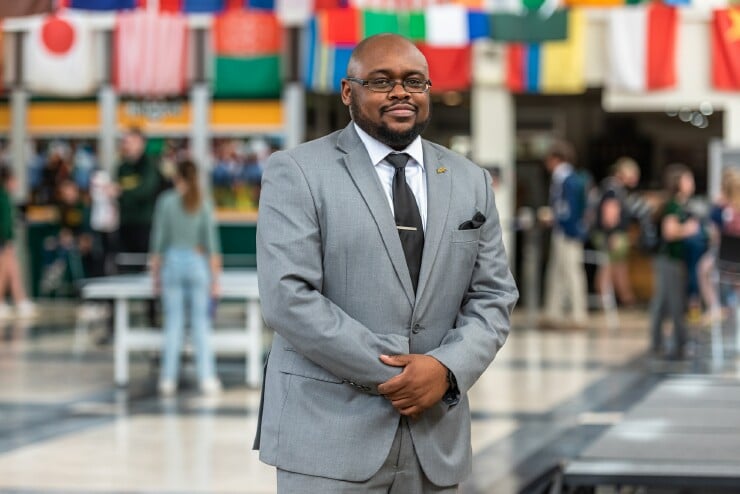
As a Fayetteville native, Director of Student Belonging and Inclusion Gavin Myrick’s experience with student involvement during his undergraduate days has fueled his love for reaching students outside of the classroom. We invite you to explore Myrick’s thoughts on Black History Month and how it impacts MU today.
Editor’s Note: As Black History Month progresses nearer to its close, so does the University’s “MU Celebrates Black History” series. Throughout the month, we’ve highlighted various stories and people on campus related to Black History Month including a preview of the top can’t-miss events, Dr. Sonny Kelly’s visit to MU for “The Talk”, Dr. Marla Frederick’s Womack Series lectures and a profile of MU’s growing Black Student Union.
There may be no better way to conclude this month’s series than with remarks from Gavin Myrick, MU’s Director of Student Belonging and Inclusion. As a Fayetteville native, Myrick’s experience with student involvement during his undergraduate days has fueled his love for reaching students outside of the classroom. Better yet, cultural programming is one of his passions at MU, overseeing many cultural events throughout the year.
We invite you to explore Myrick’s thoughts on Black History Month and how it impacts MU today.
In today’s political climate, now is as important as it has ever been to teach youth about African-American history. It is important that we as a nation remember, recognize and celebrate all the great contributions that our ancestors have made to the advancement of, not only this country, but this world. It is important because there are children growing up today who have no idea of what it was like for people of color in this country, during not only the Civil Rights era, but long before.
When I was growing up, there were many instances in which I was informed about the past and what took place. My parents and teachers made a point to make sure that I knew not only the major names like Dr. Martin Luther King Jr. and Malcolm X, but they also taught me about George Washington Carver, Jesse Owens, Althea Gibson and many more who accomplished so much without being seen as an equal citizen in this country.
My grandmother grew up during a time in which segregation was the law of the land. Thus, she had to experience all the inequalities that came along with that. My mother and father were born in the 1960s and grew up in the 1970s during the Civil Rights Movement. I came along in the 1980s as a beneficiary of all the hard work and sacrifices of those who fought for voting rights and equality.
That leads to today here at Methodist University. There are many things that our students are able to take advantage of today because they stand on the shoulders of the giants who came before them. MU is the most diverse campus in the state of North Carolina, which is only possible with the contributions of the past.
MU has taken steps to make sure that our campus is equitable and inclusive to our students. There is always more work to be done, and MU’s Chief Diversity Officer, Dr. Quincy Malloy, and others have taken the charge to ensure that this university continues to move forward.
With the growing number of African-American students here on campus, it is important that the MU community takes the time to reflect on the historical backgrounds of those students. Nothing helps you feel welcome at your university like being represented through the programming efforts of the organizations on campus. Our students should know that MU takes the sacrifices made by the African-American leaders of the past seriously and makes it a point to acknowledge and honor our Black heroes throughout history. All of our students deserve to be educated on the history of this nation and the contributions that Black people have had on it.
Some might ask: Why celebrate Black History Month? I would tell you it is because it holds a part of American history, which is sown with the influence, intelligence and sacrifice of Black people from its inception. Black history is more than slavery, Dr. King and Rosa Parks. There are contributions from people we have never had the chance to learn about.
Although Black History Month is concluding soon, I invite everyone to take the time to educate themselves on how impactful African Americans have been on this country.